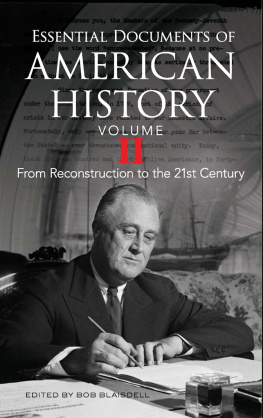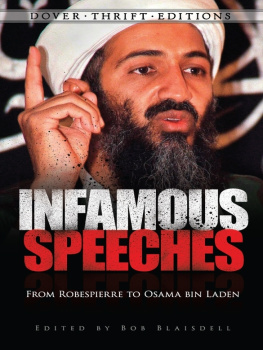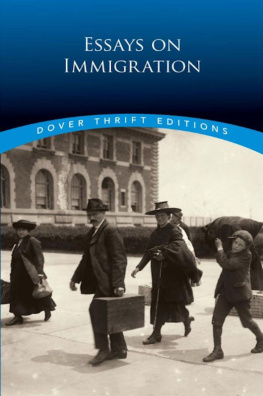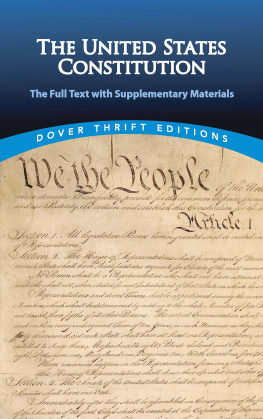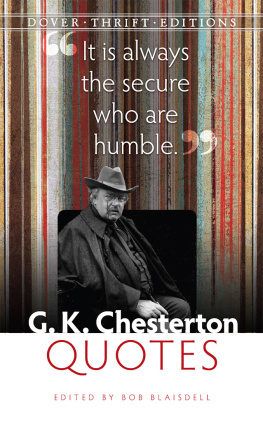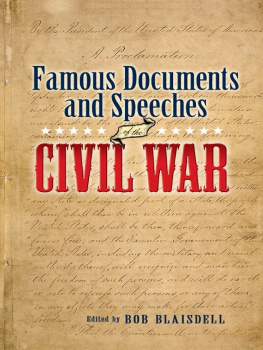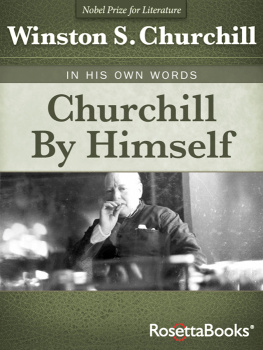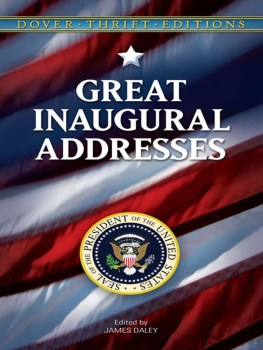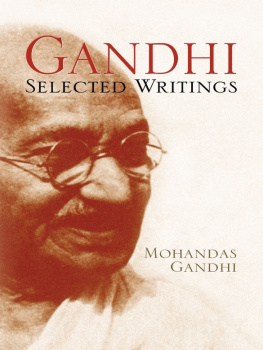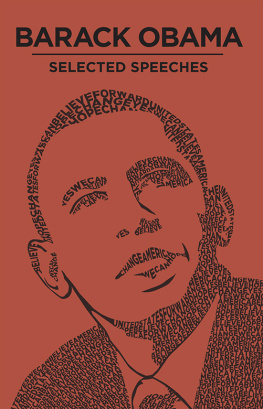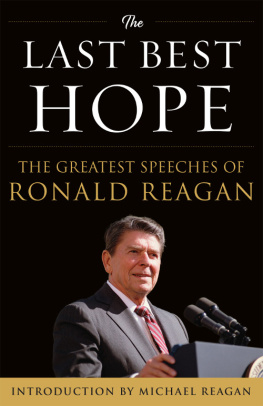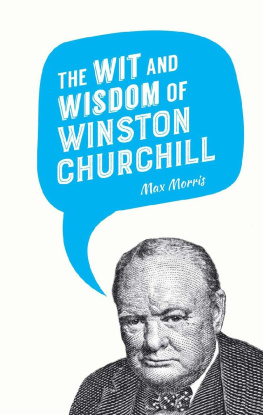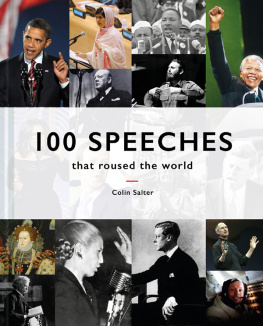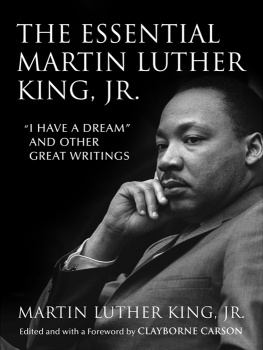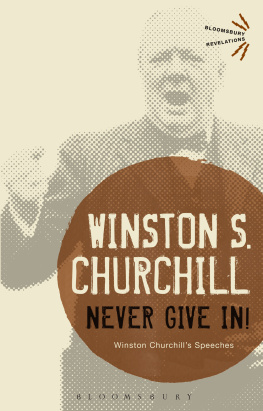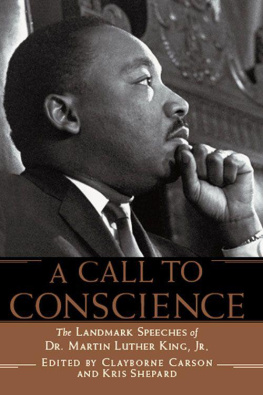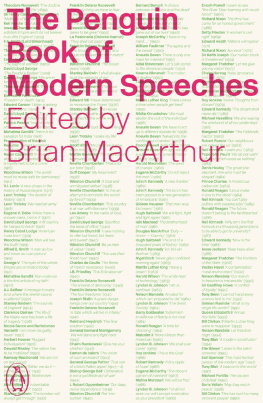
Great Speeches of the Twentieth Century
Edited by Bob Blaisdell

DOVER PUBLICATIONS, INC.
Mineola, New York
DOVER THRIFT EDITIONS
G ENERAL E DITOR : M ARY C AROLYN W ALDREP
E DITOR OF T HIS V OLUME : J ANET B AINE K OPITO
Copyright
Introduction copyright 2011 by Bob Blaisdell
All rights reserved.
Bibliographical Note
Great Speeches of the Twentieth Century is a new compilation, first published by Dover Publications, Inc., in 2011. An Introduction has been written specially for the Dover edition by Bob Blaisdell, who has also prepared a note for each speech. Minor inconsistencies and other style vagaries derive from the original sources and have been retained for the sake of authenticity.
Library of Congress Cataloging-in-Publication Data
Great speeches of the twentieth century
p. cm.
Great Speeches of the Twentieth Century is a new compilation, first published by Dover Publications, Inc., in 2011. An Introduction has been written specially for the Dover edition by Bob Blaisdell, who has also prepared a note for each speech.T.p. verso.
eISBN-13: 978-0-486-47467-0
1. Speeches, addresses, etc. I. Blaisdell, Robert.
PN6121.G74 2011 808.85dc22
2011042826
Manufactured in the United States by Courier Corporation 47467401
www.doverpublications.com
Introduction to the Dover Edition
These are speeches of politics and peace, commemoration and tolerance, calls for freedom of speech and cries for independence, with only an occasional rallying to arms. In these outpourings we can witness a shorthand history of the political movements, wars, and social progress of the twentieth century. While there are so many varieties of speeches with such varying purposes, the speakers are necessarily famous in themselves or as participants in burgeoning movements, historical events, or crises.
Early in the century, for instance, we hear president of the United States Theodore Roosevelts ecstasy over the Grand Canyon and the treasures of nature (In the Grand Canyon, Arizona has a natural wonder which, so far as I know, is, in kind, absolutely unparalleled throughout the rest of the world. I want to ask you to do one thing in connection with it, in your own interest and in the interest of the countryto keep this great wonder of nature as it now is).
In the 1920s, the persecuted womens rights advocate Margaret Sanger argues for a womans right to birth control (We claim that woman should have the right over her own body and to say if she shall or if she shall not be a mother, as she sees fit. We further claim that the first right of a child is to be desired. While the second right is that it should be conceived in love, and the third, that it should have a heritage of sound health), and in the last decade of the twentieth century we hear, at President Clintons National Prayer Breakfast, the Nobel Peace Prize winner Mother Teresa of Calcutta ruing the prevalence of abortion: I feel that the greatest destroyer of peace today is abortion, because it is a war against the childa direct killing of the innocent childmurder by the mother herself. And if we accept that a mother can kill her own child, how can we tell other people not to kill one another?
What a contrast, what a historical revolution we see in the United States, when in 1906 the teacher and civil rights advocate Mary Church Terrell bemoans the entrenched racism in Washington, D.C. (I might go on citing instance after instance to show the variety of ways in which our people are sacrificed on the altar of prejudice in the Capital of the United States and how almost insurmountable are the obstacles which block his path to success), and a hundred years later Barack Obama responds to his voters joy at his election as the forty-fourth president of the United States: If there is anyone out there who still doubts that America is a place where all things are possible, who still wonders if the dream of our founders is alive in our time, who still questions the power of our democracy, tonight is your answer.
In war we meet national leaders, from David Lloyd George and Vladimir Lenin to Winston Churchill and Charles de Gaulle to John F. Kennedy; in grueling, confrontational politics we meet the Communist revolutionary Che Guevara lambasting United States foreign policy (The Soviet Union and the Peoples Republic of China have given serious warning to the United States. Not only the peace of the world is in danger in this situation, but also the lives of millions of human beings in this part of Asia are being constantly threatened and subjected to the whim of the United States invader); and at the Berlin Wall the U.S. President Ronald Reagan upstaging the U.S.S.R.s general secretary: We welcome change and openness; for we believe that freedom and security go together, that the advance of human liberty can only strengthen the cause of world peace. There is one sign the Soviets can make that would be unmistakable, that would advance dramatically the cause of freedom and peace. General Secretary Gorbachev, if you seek peace, if you seek prosperity for the Soviet Union and Eastern Europe, if you seek liberalization: Come here to this gate! Mr. Gorbachev, open this gate! Mr. Gorbachev, tear down this wall!
What makes these speeches outstanding are that for the most part they moved their listeners into moral reflection and action. There is almost no end to the research and discovery possible about the background of the individual speakers and the influence and aftermath of the speeches, and there is also certainly no gainsaying that many more great speeches of the twentieth century are available and ready to be read, heard, and discussed. A good number of the texts in this volume come from the fourth edition of The Worlds Great Speeches edited by Lewis Copeland, Lawrence W. Lamm, and Stephen J. McKenna, and while their edition provides the heart of the speeches, they are not necessarily always complete or definitive. When the speeches have an identifying title in the source materials, that is the title given. I have provided a representative quotation as a subtitle for each selection. Finally, I would like to thank my friends Daniel Evan Weiss and Ann Braybrooks and my parents, Marilyn and Bill Blaisdell, for their suggestions of great and memorable speeches from their lifetimes.
Bob Blaisdell
New York City 2011
CONTENTS
Theodore Roosevelt
Mary Church Terrell
Emma Goldman
Carlos Montezuma (Wassaja)
Emmeline Pankhurst
David Lloyd George
Vladimir Lenin
Mohandas K. Gandhi
Marcus Garvey
Margaret Sanger
Alfred E. Smith
Eamon de Valera
Haile Selassie
Edward VIII
Winston Churchill
Charles de Gaulle
Franklin Delano Roosevelt
George S. Patton, Jr.
W. E. B. Du Bois
Jawaharlal Nehru
Paul Robeson
Margaret Chase Smith
Eleanor Roosevelt


